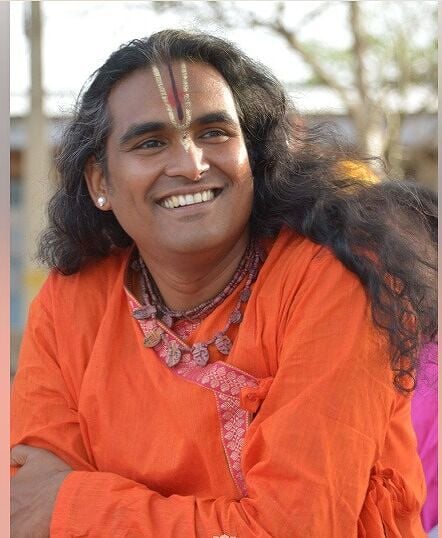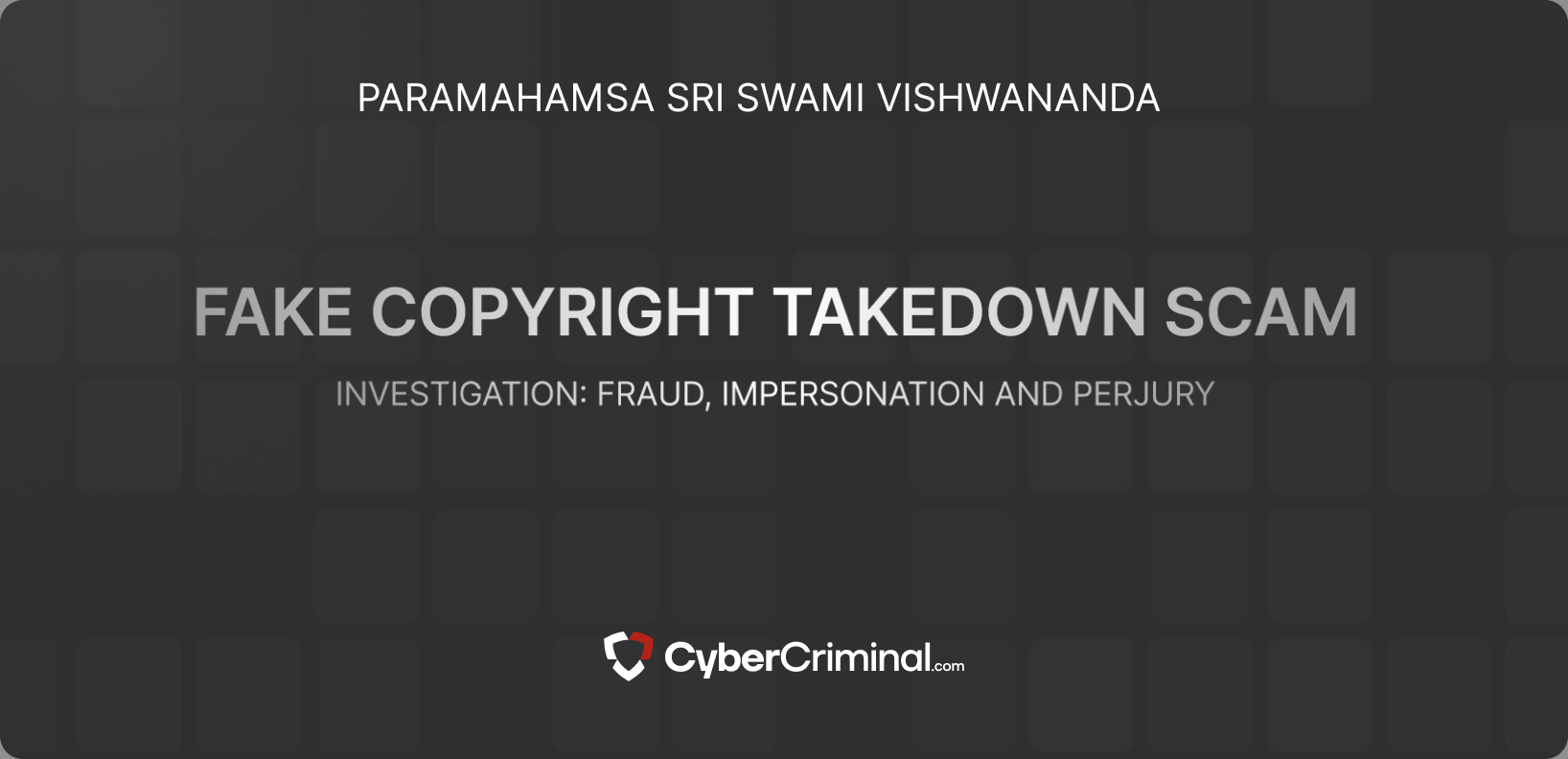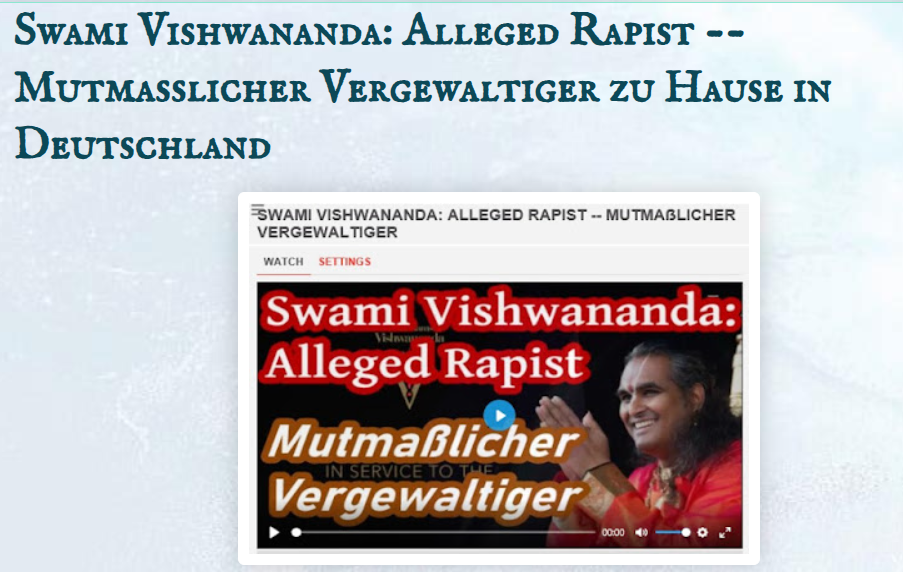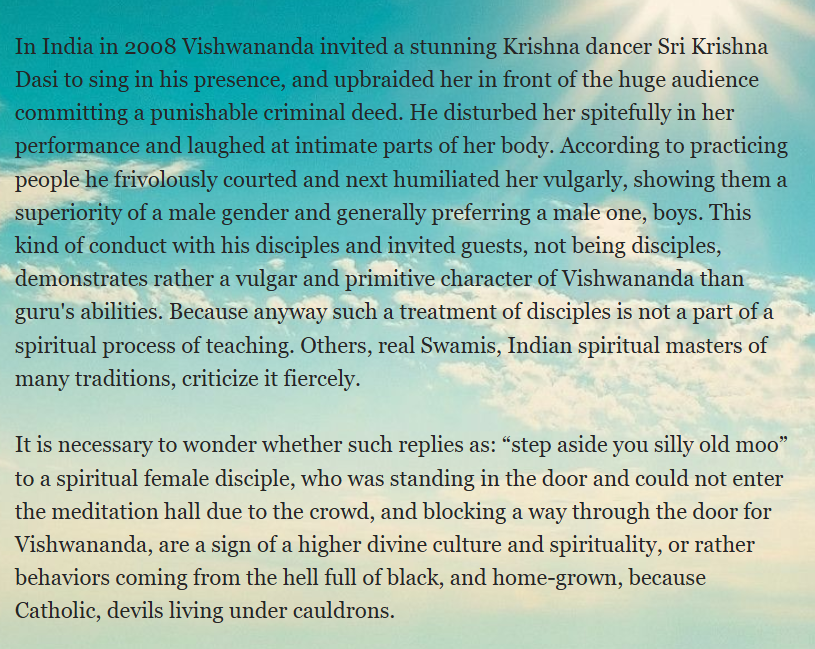- Home
- Investigations
- Paramahamsa Sri Swami Vishwananda

Paramahamsa Sri Swami Vishwananda
Threat Alert- Investigation status
- Ongoing
We are investigating Paramahamsa Sri Swami Vishwananda for allegedly attempting to conceal critical reviews and adverse news from Google by improperly submitting copyright takedown notices. This includes potential violations such as impersonation, fraud, and perjury.
- Alias
-
Mahadeosingh 'Visham' Komalram
- Company
-
Bhakti Marga
- City
-
Heidenrod
- Country
-
Germany
- Allegations
-
Sexual Misconduct

- https://lumendatabase.org/notices/40206129
- https://lumendatabase.org/notices/41970798
- https://lumendatabase.org/notices/41197500
- https://lumendatabase.org/notices/41059417
- https://lumendatabase.org/notices/39861893
- https://lumendatabase.org/notices/39998576
- Mar 18, 2024
- June 2, 2024
- April 30, 2024
- April 24, 2024
- March 08, 2024
- David James Corp
- ALT News Group
- David E. Andrews
- James A. Monroy
- David James Corp
- https://www.cultnews101.com/2022/02/just-love-bhakti-margas-guru-and-his.html
- https://www.altnewsgroup.com/2019/02/swami-vishwananda-alleged-rapist.html
- https://www.tumblr.com/questionofspiritualgod/749102228751695872/expose-of-swami-vishwanandas-bhakti-marga
- https://www.tumblr.com/questionofspiritualgod/748653183664046080/sai-baba-vishwananda-etc-the-question-of-godmen
- https://www.wilx.com/content/news/Michigan-man-faces-murder-charge-in-2014-shooting-death-380817621.html
- https://poszukiwaczeprawdyeu.wordpress.com/2014/02/04/swami-vishwananda-a-sweet-face-of-the-baleful-beast/
- https://www.ecstaticascension.com/p/swami-vishwananda-alleged-rapist.html
- http://krishna1008.blogspot.com/2022/04/expose-of-swami-vishwanandas-bhakti.html?m=1
- http://thequestionofgodmen.blogspot.com/2006/03/sai-baba-vishwananda-etc-question-of.html
- https://vishwanandaexposed.tumblr.com/
- https://www.cultnews101.com/2022/02/just-love-bhakti-margas-guru-and-his.html
Evidence Box and Screenshots






3 Alerts on Paramahamsa Sri Swami Vishwananda
- RED FLAGS
Paramahamsa Sri Swami Vishwananda: Review
Paramahamsa Sri Swami Vishwananda, born Mahadeosingh Komalram in Mauritius in 1978, founded Bhakti Marga in 2005, promoting a global network of ashrams and Atma Kriya ...
Visit Link- RED FLAGS
Paramahamsa Sri Swami Vishwananda: Legacy Review
Paramahamsa Sri Swami Vishwananda's "Just Love" movement, a vast web of ashrams and neo-Hindu sanctuaries, unravels amid serious allegations of sexual abuse involving ...
Visit Link- RED FLAGS
Paramahamsa Sri Swami Vishwananda: Ethical Concerns
Paramahamsa Sri Swami Vishwananda's "Just Love" empire, a sprawling network of ashrams and neo-Hindu retreats, crumbles under waves of sexual abuse allegations from yo...
Visit LinkHow Was This Done?
The fake DMCA notices we found always use the ? back-dated article? technique. With this technique, the wrongful notice sender (or copier) creates a copy of a ? true original? article and back-dates it, creating a ? fake original? article (a copy of the true original) that, at first glance, appears to have been published before the true original.


What Happens Next?
The fake DMCA notices we found always use the ? back-dated article? technique. With this technique, the wrongful notice sender (or copier) creates a copy of a ? true original? article and back-dates it, creating a ? fake original? article (a copy of the true original) that, at first glance, appears to have been published before the true original.
01
Inform Google about the fake DMCA scam
Report the fraudulent DMCA takedown to Google, including any supporting evidence. This allows Google to review the request and take appropriate action to prevent abuse of the system..
02
Share findings with journalists and media
Distribute the findings to journalists and media outlets to raise public awareness. Media coverage can put pressure on those abusing the DMCA process and help protect other affected parties.
03
Inform Lumen Database
Submit the details of the fake DMCA notice to the Lumen Database to ensure the case is publicly documented. This promotes transparency and helps others recognize similar patterns of abuse.
04
File counter notice to reinstate articles
Submit a counter notice to Google or the relevant platform to restore any wrongfully removed articles. Ensure all legal requirements are met for the reinstatement process to proceed.
05
Increase exposure to critical articles
Re-share or promote the affected articles to recover visibility. Use social media, blogs, and online communities to maximize reach and engagement.
06
Expand investigation to identify similar fake DMCAs
Widen the scope of the investigation to uncover additional instances of fake DMCA notices. Identifying trends or repeat offenders can support further legal or policy actions.

Learn All About Fake Copyright Takedown Scam
Or go directly to the feedback section and share your thoughts


Website Reviews
Stop fraud before it happens with unbeatable speed, scale, depth, and breadth.
Recent Reviews

Cyber Investigation
Uncover hidden digital threats and secure your assets with our expert cyber investigation services.
Recent Reviews

Threat Alerts
Stay ahead of cyber threats with our daily list of the latest alerts and vulnerabilities.
Recent Reviews

Client Dashboard
Your trusted source for breaking news and insights on cybercrime and digital security trends.
Recent Reviews
Payomatix
Fake DMCA Investigation
Ruchi Rathor
Fake DMCA Investigation
Gamsgo
Fake DMCA Investigation
User Reviews
Discover what real users think about our service through their honest and unfiltered reviews.
1.5
Average Ratings
Based on 6 Ratings
Jetton Gantt
Bro this is wild... relic theft? black magic? sex abuse? How is this guy not in jail?
12
12
Mylah Pogue
This guy really just skipped a court hearing because he was on a "tour"? Sounds more like dodging accountability to me.
12
12
Dash Hanley
So he talks love but hides behind lawyers whenever something real comes out. Very telling.
12
12
Zelda Vick
I used to be curious about Bhakti Marga, but after reading this... nope. Feels like spiritual manipulation 101.
12
12
Harlem Newsom
How can anyone still follow this man after all that? It’s like a cult wrapped in a robe of spirituality.
12
12
Nia Nsengiyumva
How many more hidden scandals must surface before this charade is called out for what it is?
12
12
Zoran Jovanović
Vishwananda's history of sexual misconduct allegations is deeply troubling and hard to ignore.
12
12
Maxton Krause
Anyone who defends this man is either unaware of his actions or choosing to ignore them. No true spiritual guide should be involved in these kinds of controversies.
12
12
Azalea Baird
It’s mind-boggling that a spiritual leader who preaches celibacy can have such disturbing allegations against him. It makes one wonder how many others have been silenced or ignored.
12
12
Dario Velazquez
This sounds less like spiritual guidance and more like a dangerous cult. If your organization is hiding behind stolen relics and legal silencing, something's seriously wrong.
12
12
Hazel Bennett
Allegations of sexual abuse and censorship? That’s not spirituality—that’s control.
12
12
Aurora Phillips
Vishwananda got caught up in a relic theft scandal, dodged court, and now silences critics with lawsuits. Hard pass.
12
12
Nolan Flores
Behind the “Just Love” slogan is a mess of lawsuits, censorship, and serious abuse allegations. Don’t fall for the facade.
12
12
You are Never Alone in Your Fight
Generate public support against the ones who wronged you!
Featured Cyber Investigations
Explore our most impactful cyber investigations, where we uncover coordinated digital deception, expose fraudulent takedown schemes, and reveal the hidden mechanics behind online manipulation.
Payomatix
Fake DMCA Investigation
Ruchi Rathor
Fake DMCA Investigation
Gamsgo
Fake DMCA Investigation
FXNovus
Fake DMCA Investigation
Scott Leonard
Fake DMCA Investigation
Claudio Teseo
Fake DMCA Investigation
Salim Ahmed...
Fake DMCA Investigation
KTV Group...
Fake DMCA Investigation